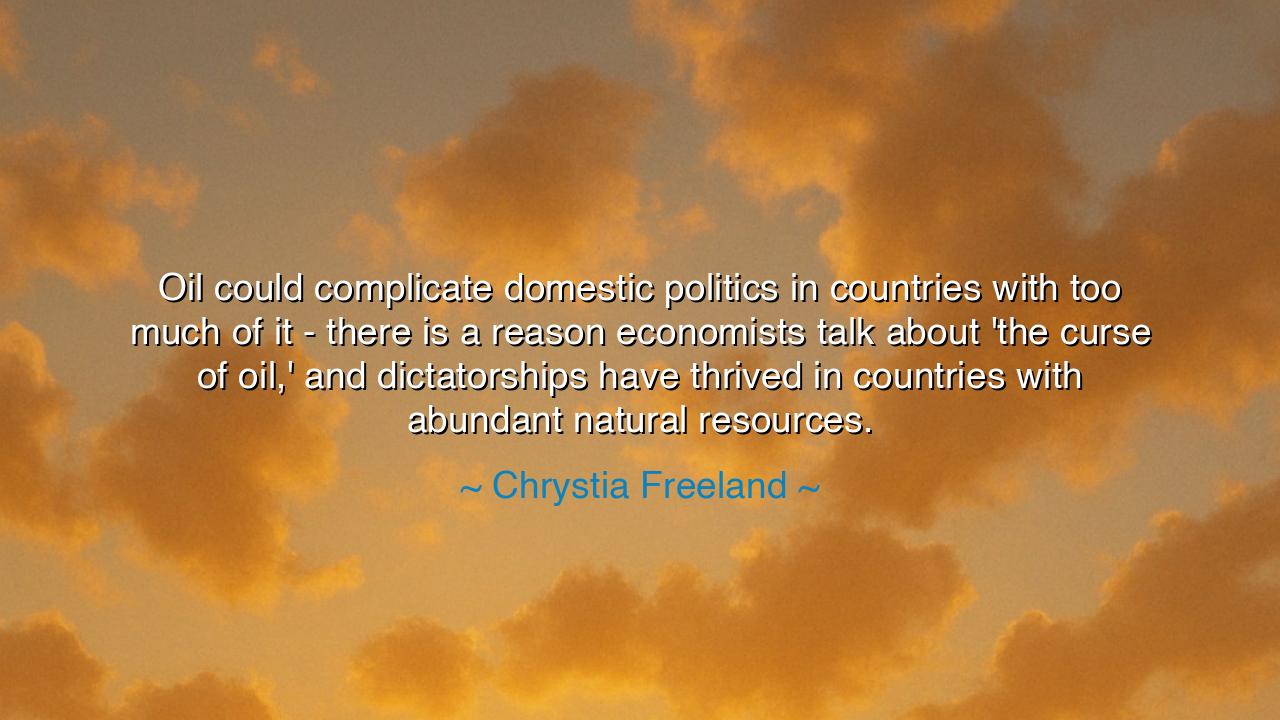
Oil could complicate domestic politics in countries with too
Oil could complicate domestic politics in countries with too much of it - there is a reason economists talk about 'the curse of oil,' and dictatorships have thrived in countries with abundant natural resources.






The words of Chrystia Freeland — “Oil could complicate domestic politics in countries with too much of it… dictatorships have thrived in countries with abundant natural resources.” — reveal the paradox of plenty. She speaks of the curse of oil, a truth known to sages of economics and to rulers alike: that wealth drawn from the earth, if not guided by wisdom, becomes not a blessing but a chain. For in the black rivers of oil lies both prosperity and peril, power and corruption, freedom and bondage.
The origin of this curse lies in the nature of abundance. When riches flow too easily, rulers may grow lazy, depending on resource wealth rather than cultivating their people’s labor, ingenuity, and freedom. Politics becomes distorted, as those in power cling not to service but to control, hoarding wealth while neglecting justice. Thus, dictatorships often root themselves in such lands, where rulers need not answer to their people, for the oil itself funds their thrones.
History bears grim witness. Consider Nigeria, rich in oil yet scarred by corruption and instability. The wells that might have lifted the people into prosperity became instead a source of division, pollution, and endless power struggles. Or look to Venezuela, where vast reserves once promised wealth beyond imagining, yet mismanagement and authoritarian rule turned abundance into ruin. In both lands, the curse of oil proved Freeland’s warning: what should have been light became shadow.
The ancients also knew this truth, though they spoke of it in other forms. They warned that sudden wealth tempts rulers into tyranny and weakens the spirit of nations. Just as the man who inherits riches without labor may squander them, so the state that leans only on resources grows brittle, vulnerable to corruption and decay. The curse is not the oil itself, but the greed and arrogance it awakens in the hearts of men.
Therefore, O children of the future, heed this teaching: natural wealth must be yoked to wisdom, lest it devour the very nation it should sustain. Let politics be guided not by the abundance of the earth alone, but by justice, industry, and the strength of free people. For only when abundance is matched with accountability can riches become a blessing. Freeland’s words are a reminder that the greatest treasure of a land is not its oil, but its people — and when they are forgotten, no wealth can save a nation from decline.






VHLe Van Hiep
Freeland’s insight about oil complicating domestic politics in some countries makes me question whether natural resources, like oil, inherently cause issues. It seems that the problem might lie more in the systems that fail to distribute wealth and power fairly. Could there be a way to ensure oil wealth supports social welfare and political transparency, or is the risk of exploitation and dictatorship too great for any country to escape?
TN9D Tuyet Nguyen
Chrystia Freeland’s comment about oil contributing to dictatorship is thought-provoking, but I’m curious—why do some countries with vast resources fall into authoritarianism while others don’t? Is it a matter of political culture, or is it simply that too much wealth leads to power struggles and inequality? Can we point to successful examples where oil wealth has been managed to support democratic institutions, or is the 'curse of oil' an inevitable reality?
T3Trang 34.
The 'curse of oil' is a fascinating concept, and Freeland’s statement makes me think about the relationship between resource wealth and political instability. But is the problem really the abundance of oil, or how it’s distributed and controlled within a country? Can a nation rich in oil resources ever overcome the risk of corruption, or does the temptation of wealth always lead to exploitation? How do other countries manage this balance successfully?
NNhatgaming_tv
Freeland's point about oil complicating domestic politics reminds me of the challenges some oil-rich nations face in maintaining stable, democratic systems. I wonder if the issue is more about governance and the institutions in place to manage oil wealth, rather than the resource itself. Are countries with abundant natural resources doomed to dictatorship, or can they avoid it by implementing strong checks and balances to prevent the concentration of power?
HTNguyen huu thanh
Chrystia Freeland’s observation about oil complicating domestic politics is an intriguing one. The 'curse of oil' is an often-discussed topic, and it makes me wonder—how much does the wealth generated from oil actually hurt countries in the long run? Do these resources create so much instability that they fuel corruption and dictatorship, or is it a matter of how these resources are managed? Can oil wealth ever truly be a blessing for a nation?